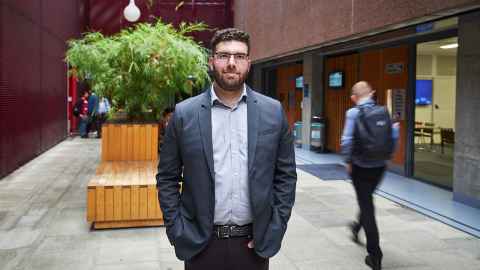Samuel Mehr: the scientist unravelling music’s mysteries
2 May 2024
A $200,000 prize is music to the ears of leading-edge researcher Samuel Mehr.

Science is like sex: it may give some practical results, but that’s not why we do it.
That sentiment – a tweaked version of a well-known quote* – finds favour with Dr Samuel Mehr, the winner of the Prime Minister’s MacDiarmid Emerging Scientist Prize.
What is music? How does it work? Why does it exist? They’re the big questions Samuel and The Music Lab, his international research group, seek to answer, drawing ideas and tools from cognitive and developmental psychology, data science and evolutionary anthropology.
Curiosity-driven basic science may be less popular and less supported when times are tight and policy makers are eyeing returns from commercially driven research.
“That is a big mistake,” says Samuel. “The best recipe for success is investing heavily in basic science. More often than not, it’s going to pay off commercially – in ways we can’t yet imagine.”
Samuel got his PhD in psychology at Harvard University, where he founded The Music Lab and met his Canadian wife-to-be, Dr Alia Martin, a developmental cognitive scientist. The couple met as Harvard researchers, worked at the School of Psychology at Te Herenga Waka – Victoria University of Wellington from 2016 to 2020, and have been named rising stars by the international Association for Psychological Science – Alia in 2017 and Samuel in 2021.
After retreating to be with family in Canada during the pandemic, the couple were lured back to Aotearoa by a Rutherford Discovery Fellowship and the appointment for Samuel in the School of Psychology at Waipapa Taumata Rau. (Alia is retraining in clinical psychology at the University of Waikato.)
The $200,000 MacDiarmid Emerging Scientist Prize recognises Samuel as a leading-edge researcher whose work will make a splash and who is effective at communicating research. Most of the money will go towards funding more research.
The best recipe for success is investing heavily in basic science.
The Music Lab’s citizen-science platform allows for gamified research projects involving millions of listeners from around the world. There you can test your ‘musical IQ’, check if you’re tone deaf, or take part in a World Music Quiz, guessing whether a song is intended to be, say, a lullaby or for dancing.
The second strand to his research is traditional lab work in developmental science and auditory perception, figuring out how infant minds make sense of sounds in music and language. Inevitably, Samuel and Alia’s children, Theo (6) and Eva (3), have featured as test subjects.
Born in Cambridge, Massachusetts, Samuel’s first musical love as a child was piano and it’s a matter of serendipity that he became a neuroscientist not a jobbing musician.
During his music degree at the University of Rochester’s Eastman School of Music, he focused on woodwinds (clarinet, flute, saxophone and oboe). In his final year, he took an elective course on cognitive development, was fascinated, and joined a Harvard research project investigating the potential effects on child cognition from participation in parent-child music classes. (Does learning music make you smarter?)
The resulting research paper, published when he was a PhD student, was entitled, ‘Two randomized trials reveal no consistent evidence for non-musical cognitive benefits of brief preschool music enrichment’. It generated a media blitz with misleading headlines such as ‘Academic benefits of music a myth’, while Samuel’s efforts to clarify included a New York Times op-ed explaining that only a tiny number of randomised controlled trials had tested the widespread belief in the cognitive benefits of music lessons and that “the findings are far from conclusive”.
After completing his doctorate, Samuel initiated The Music Lab at Harvard with funding from the US National Institutes of Health, moving it to Waipapa Taumata Rau and the Yale Child Study Center in 2022. It continues to prove a rich area of research.
“Music is an odd phenomenon,” Samuel once said, in an interview with Pacific Standard.
“It’s universal, it’s ancient, it’s an activity enjoyed by humans of all ages, and yet it’s not at all clear why it exists in the first place.”
Paul Panckhurst
* Note: The quote “Physics is like sex: sure, it may give some practical results, but that’s not why we do it” is attributed to the bongo-playing, Nobel-prize-winning, 20th century physicist Richard Feynman, although it’s not certain that he ever said it.
This story first appeared in the May 2024 edition of UniNews.